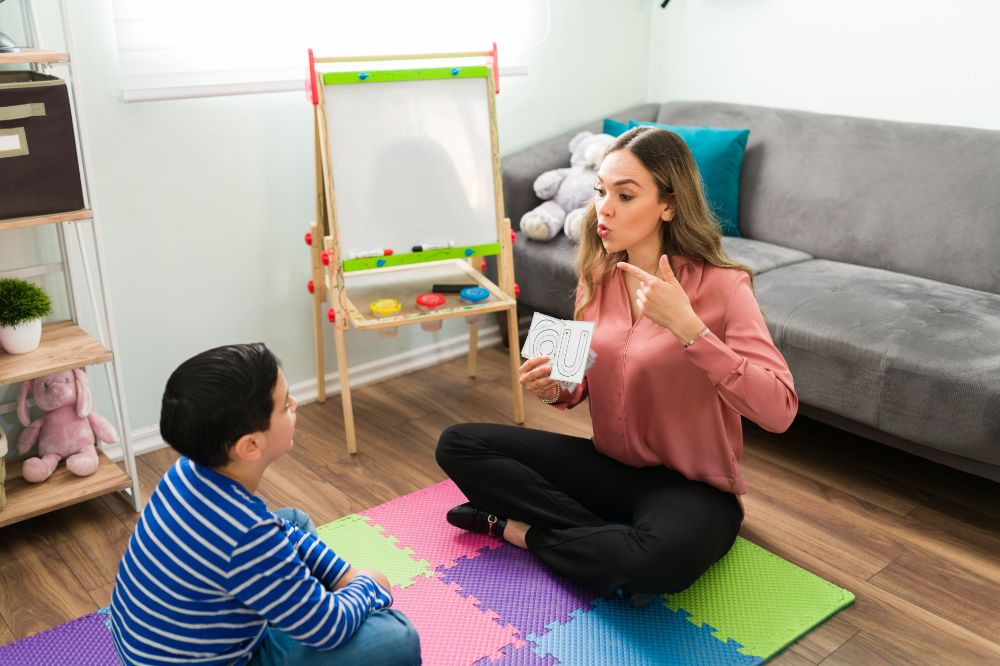When it comes to speech therapy, Wh- questions are like secret keys to unlocking a young mind’s communication skills. Imagine them as little building blocks for your child’s language development. They help your little one explore, think deeply, and express their thoughts.
In particular, Why questions speech therapy can help your child grow in so many ways. They make learning fun and exciting, helping your child talk better, understand more, and say what’s on their mind.
Below, we’ll talk about why these basic questions are such a big deal in speech therapy. We’ll also share some cool tips to use them with your child. By the end, you’ll see how they can help your little one become a confident and effective communicator.
Why Questions Speech Therapy

Kids are naturally curious, and Why questions are like magic tools that help them satisfy their thirst for knowledge. It’s all about asking why things happen, and it’s a bit like being a detective. Your child gets to dig deeper and figure out the reasons behind things.
Why questions also make your child’s brain super strong. They help your little one connect the dots, find answers, and express themselves really well. It’s like a workout for their complex thinking skills, helping them become problem solvers and understand how things work.
In short, Why questions are like sparks that ignite your child’s curiosity and make them active learners in their own exciting journey of discovery.
The Link Between Why Questions and Successful Speech Therapy
Speech therapists use Why questions to understand how your child talks and listens. It’s a bit like a detective figuring out clues. So, when your child answers these questions, therapists can see what’s working well and where they might need some extra help.
But here’s where it gets even cooler. Why questions also help therapists plan fun activities that help your child talk even better. Whether it’s saying sounds more clearly, learning new words, or working on talking sentences, these critical thinking questions give therapists a game plan.
So, think of them as the secret sauce that helps your child’s speech therapy sessions be engaging and super effective. They’re like the bridge that takes your child from where they are now to becoming an awesome communicator.
Types of Why Questions in Speech Therapy for Kids
When it comes to speech therapy for kids, Why questions are versatile tools that can be categorized to suit specific objectives. These categories not only make learning engaging but also help therapists address various speech therapy goals more effectively.
Let’s delve into some of these categories and see how they cater to the unique needs of children.
Functional Why Questions
Functional Why questions are the type of questions that seek to uncover the underlying reasons for using specific objects or engaging in particular actions.
These questions are designed to help children grasp the practical aspects of their surroundings and activities. By understanding the functions and purposes of everyday items and actions, children can make meaningful connections to the world around them.
Here are some examples of basic function questions:
- Why do we use a toothbrush?
- Why do we wear shoes when we go outside?
- Why do we need to eat fruits and vegetables?
Motivational Why Questions
Motivational Why questions help children explore the emotional and social aspects of human interactions, enhancing their perspective-taking skills and empathy.
They encourage children to consider the feelings and intentions of others, promoting more profound social and emotional understanding. Here are three examples of motivational Why questions:
- Why do you think Timmy helped his classmate pick up the fallen books?
- Why do you think Emma felt happy when she received a thank-you card from her friend?
- Why do you think Max shared his favorite snack with his little brother even though he really liked it?
Sequential Why Questions
Sequential Why questions are a series of inquiries that delve into the cause-and-effect relationships behind events or actions.
This question type is designed to guide children in comprehending the logical order of occurrences and the reasoning behind them. They encourage critical thinking and help children make connections between actions and outcomes.
Here are three examples of sequential Why questions:
- Why did the plants in the garden start wilting?
- Why did the car stop moving when the gas tank was empty?
- Why did the cookies burn in the oven when they were left in for too long?
Problem-Solving Why Questions
Problem-solving Why questions are types of questions that stimulate children’s analytical thinking and encourage them to explore solutions to complex situations or challenges.
These questions promote critical thinking and nurture creative problem-solving abilities in children. They empower young minds to assess problems, brainstorm solutions, and exercise their reasoning skills.
Here are three examples of problem-solving Why questions:
- Why is the main character in the story feeling sad, and what can they do to feel better?
- Why is the puzzle missing a piece, and how can we complete it?
- Why do the plants in the garden have yellow leaves, and what can we do to help them thrive again?
Why Questions for Speech Therapy At Home

By bringing Why questions into your child’s speech therapy at home, you’re turning learning into a thrilling adventure. It’s a journey where curiosity and fun lead the way, and your child becomes a confident and skilled communicator!
During Therapy
- Engaging Storytelling: Start therapy sessions with a magical story that’s full of Why questions. It’s like going on a treasure hunt for answers and encourages your child to join in the fun.
- Visual Aids: Think of pictures or drawings as your secret weapons. They help make Why questions less mysterious and more like a cool adventure. For example, when you ask a Why question, show a picture to help your child understand.
- Modeling Responses: Show your child how to answer Why questions with clear and complete sentences. It’s a bit like being a coach, teaching your child how to play a game. Encourage them to copy your answers.
Fun Activities At Home
- Game Time: Turn learning into a game! Create speech therapy games that involve Why questions, like going on a “Why Quest” adventure. Your child can answer the questions to move forward, just like a hero on a mission.
- Story Magic: Imagine you and your child are storytellers. You can create stories together that have Why and other simple Wh questions in them. It’s like making up your very own fairy tales while working on speech therapy goals.
- Art and Imagination: Get creative! Try drawing or crafting with your child while exploring Why questions. Ask them to draw or make something that explains why a character in a story feels a certain way. It’s like art with a dash of adventure.
For Different Ages and Goals
- Simple and Sweet: For younger kids or those who are just starting, keep the questions simple and use short words. For example, start with easy puzzles and move to harder ones as your child gets better.
- Big Kid Challenges: If your child is older, you can ask them Why questions with more complicated answers. It’s like leveling up in a game; they’re ready for the next challenge!
- Tailored to Goals: Think of Why questions as special tools. If your child is working on saying sounds or words better, ask Why questions related to those sounds or words.
The Speech Therapist’s Role in Employing Why Questions
Imagine speech therapists as friendly guides on your child’s journey to better communication. They have this magical way of making Why questions exciting and easy to understand. Here’s how they do it:
- Safe and Fun Environment: Therapists create a special space where your child feels happy and safe. For your child, it’s like going on a fun adventure with a trusted friend.
- Talking Your Child’s Way: They know just how to talk to kids. Using words and talking speed that your child can understand is like speaking in your child’s language.
- Creative and Fun Techniques: Therapists are like wizards with cool tricks. They use fun games and activities to make therapy sessions super interesting.
Working Together With Parents and Caregivers
Here’s where you come in. Teamwork between speech-language pathologists, parents, and caregivers is the secret to making speech therapy work wonders.
- Guidance and Resources: Therapists share their tips and tools with parents. They help you become a Why question champion at home.
- Learning Everywhere: Together, you make learning happen everywhere, at therapy sessions and home. This way, your child gets a double dose of speech therapy.
So, think of speech therapists as your child’s communication heroes, and you’re their trusty sidekick. Together, you’re all on a mission to make talking and learning a fantastic adventure!
Overcoming Challenges and Frustrations
Using Why questions in speech therapy with your child can sometimes be like a thrilling rollercoaster ride, full of ups and downs. But with patience, flexibility, and a few tricks up your sleeve, you can conquer the challenges and make the journey smoother.
Patience and flexibility are your trusty companions on this adventure. Remember, every child learns at their own pace, and it’s okay if things don’t go perfectly every time. Be patient with your child, and be ready to adapt your approach as needed.
Addressing Potential Difficulties in Using ‘Why’ Questions
- Limited Vocabulary: If your child has a small vocabulary, they might find it hard to answer complex Wh questions. Start with simpler ones and gradually make them more challenging.
- Short Attention Spans: Young children often have short attention spans. Keep activities short and engaging to prevent frustration.
- Avoiding I Don’t Know: Sometimes, kids might answer “I don’t know” to Why questions. Encourage them to guess or use clues from the question to help them answer.
Strategies for Managing Resistance or Frustration in Children
- Positive Reinforcement: Praise your child’s efforts, even if they don’t get it right every time. Positive feedback boosts their confidence.
- Take Breaks: If your child gets frustrated, take a break and come back to the speech therapy activity later. It’s okay to press pause and restart.
- Keep It Fun: Make Why questions a part of playtime. When learning is fun, your child is more likely to stay engaged and enjoy the process.
Remember, the road to better communication may have a few bumps, but with patience, a flexible approach, and lots of encouragement, you and your child can conquer any challenges that come your way.
Building Strong Communicators
Why questions speech therapy aren’t just simple questions. They are the sparks that ignite your child’s confidence and turn them into amazing communicators.
So, as you and your child embark on this journey together, remember to be patient, flexible, and ready for adventure. Over time, your child’s curiosity and creativity will blossom, and their communication skills will soar.
Keep those whys flowing, keep exploring the world together, and witness the enchanting growth of your child’s vocabulary and wonder-filled world. With Why questions as your guide, you’re nurturing not just speech but a lifelong love for learning and expression.

